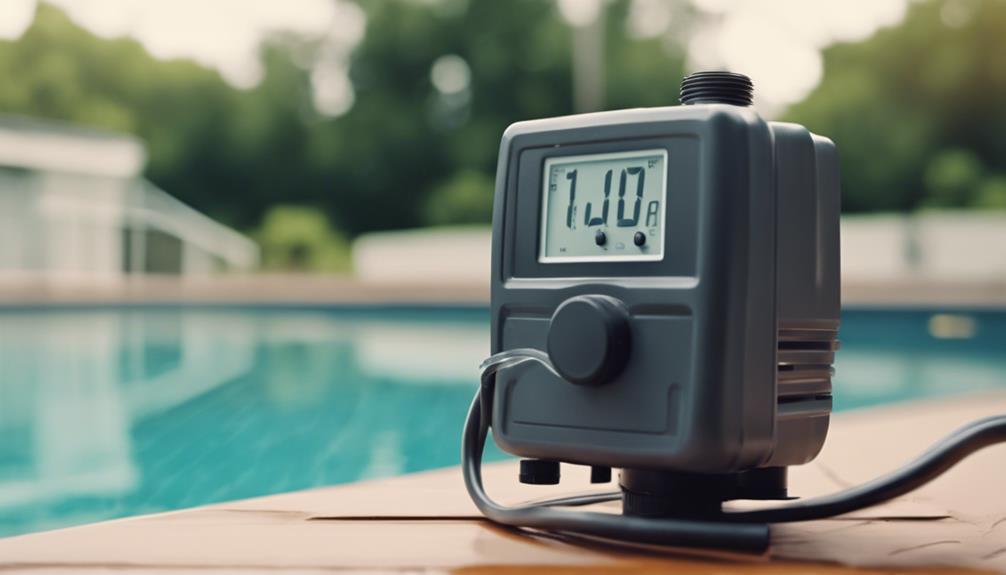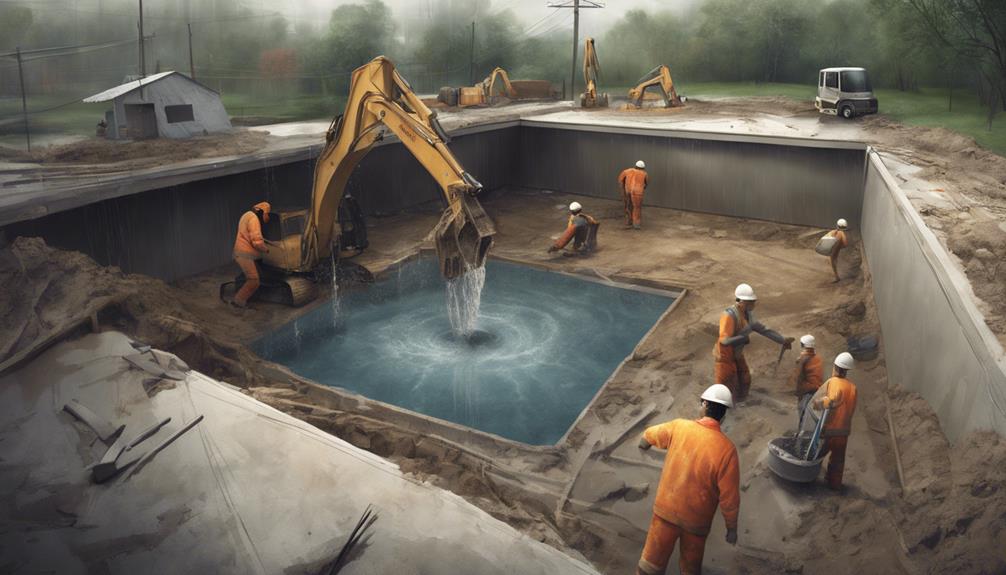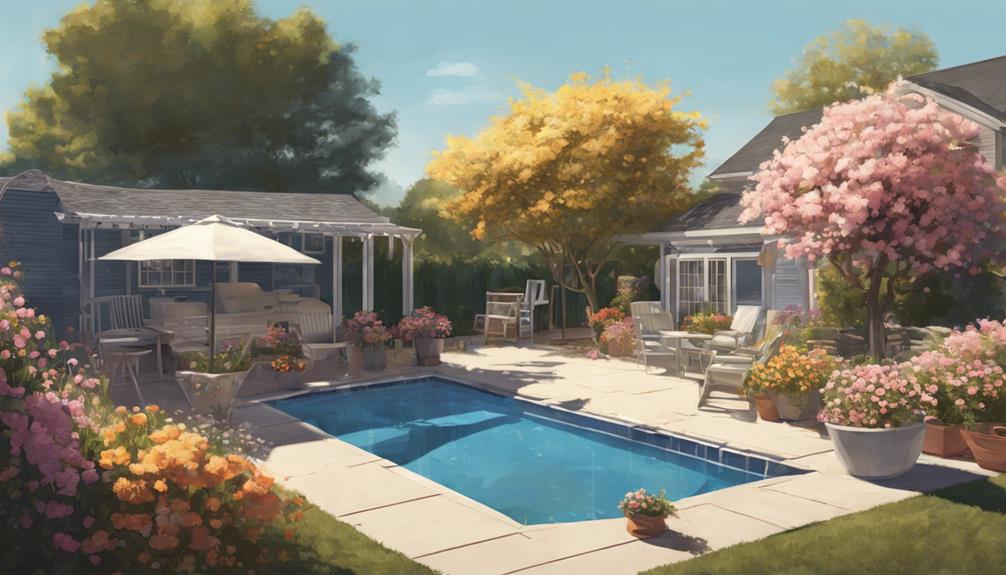For the most energy-efficient swimming pool, consider utilizing solar covers to decrease evaporation by 30-60% and lower heating costs by 50-70%. Opt for variable-speed pumps to save 30-45% energy, heat pumps for up to 80% savings on heating, and run pumps during off-peak hours. Regularly monitor water temperature for efficient heating and replace filter sand every 5 years. Incorporate LED lights, pool covers, and keep drains clean to further reduce energy consumption. Keep in mind, optimized circulation systems and eco-friendly cleaning methods are crucial for maintaining an energy-efficient pool.
Key Takeaways
- Solar covers reduce evaporation by 30-60% and heating costs by 50-70%.
- Variable-speed pumps offer 30-45% energy savings for efficient circulation.
- Regular heater maintenance and optimized circulation systems enhance energy efficiency.
- LED lighting, pool covers, and eco-friendly cleaning methods reduce energy consumption.
- Running pumps during off-peak hours and using automated timers save energy.
Solar Covers for Evaporation Control
Using solar covers for your swimming pool is a practical way to reduce evaporation and enhance energy efficiency. These covers not only help in retaining the pool's heat but also decrease water evaporation by a substantial 30-60%.
By reducing evaporation, you can cut down on heating costs significantly, saving you around 50-70% on your energy bills. Additionally, when paired with a slower pump speed, solar covers contribute to lowering power consumption during pool maintenance tasks.
To amplify the benefits, consider installing windbreaks around your pool, which can further reduce evaporation by up to 30%, ultimately enhancing the overall energy efficiency of your pool.
Opting for a solar cover is a cost-effective method to conserve energy, maintain a more efficient swimming pool, and decrease the need for additional chemicals due to the reduced evaporation rates. It's a simple yet effective way to make your pool more eco-friendly and budget-friendly.
Efficient Pump Technologies

To further enhance the energy efficiency of your swimming pool, consider incorporating efficient pump technologies that can greatly reduce energy consumption. Variable-speed pumps are a fantastic option, as they can cut down energy use by 30-45% when compared to traditional pumps. Heat pumps are another excellent choice, offering impressive energy savings of up to 80% over gas heaters for pool heating. Running your pool filtration systems during off-peak hours is a smart move to optimize energy consumption, while circulating water through a filter once daily is sufficient for effective water maintenance. Additionally, setting up automatic timers for pool heaters and pumps can play a significant role in your energy conservation efforts. Investing in these energy-efficient pump technologies not only helps in reducing energy costs but also contributes to a more environmentally friendly approach to pool maintenance. Installing a pool cover is another practical measure to minimize heat loss and evaporation, further enhancing the overall energy efficiency of your pool. For those with hot tubs, many of these energy-saving strategies, like using heat pumps and automatic timers, can also be applied, boosting hot tub energy efficiency significantly. By combining these methods, you can enjoy your pool and hot tub year-round while reducing your ecological footprint and keeping operational costs in check.
| Efficient Pump Technologies | Benefits |
|---|---|
| Variable-speed pumps | 30-45% energy savings |
| Heat pumps | Up to 80% savings for pool heating |
| Running during off-peak hours | Optimizes energy consumption |
| Circulating water once daily | Effective water maintenance |
| Automatic timers | Contribute to energy conservation |
Heater Maintenance Best Practices

How can you optimize energy usage and reduce utility costs through effective heater maintenance practices for your swimming pool? To guarantee your pool heater operates efficiently and economically, follow these best practices:
- Regular Temperature Monitoring: Keep an eye on your water temperature to prevent unnecessary heating, which can lead to increased energy costs.
- Scheduled Maintenance Checks: Conduct regular maintenance on your pool heater to make sure it functions at its best, reducing the risk of energy inefficiency.
- Filter Maintenance: Changing the sand in your filters every 5 years and using recycled glass media can improve filtration efficiency, leading to energy savings.
Optimized Circulation Systems

Optimize your swimming pool's energy efficiency by implementing circulation systems that utilize variable speed pumps for significant energy savings. These pumps can reduce energy consumption by 30-45% compared to single-speed pumps, resulting in annual savings of up to $300 or more. Running your pool filtration system during off-peak hours can further optimize energy usage, while circulating pool water through filters once a day is sufficient for effective maintenance. Automated timers for pumps and heaters can also enhance energy efficiency by ensuring they only run when necessary. To combat heat loss and reduce energy consumption, consider investing in LED lights for your pool, using a pool cover when not in use, and being mindful of the length of your pool season. By incorporating these energy-efficient pool products and practices, you can enjoy a more sustainable and cost-effective swimming experience.
| Pool Product | Description | Benefits |
|---|---|---|
| Variable Speed Pumps | Adjust speed based on need | Significant energy savings |
| LED Lights | Energy-efficient lighting | Reduced energy consumption |
| Pool Cover | Minimizes heat loss and evaporation | Lower energy costs |
Eco-Friendly Pool Cleaning Methods

Enhance the energy efficiency of your swimming pool by adopting eco-friendly pool cleaning methods that not only promote sustainability but also contribute to cost savings over time.
When it comes to maintaining a clean and energy-efficient pool, consider the following tips:
- Using automatic pool cleaners can help reduce energy consumption by operating efficiently for specific time durations.
- LED lighting in pools is a long-lasting, energy-efficient solution that can last up to 30,000 hours.
- Ensuring clean drains and utilizing wall brushes and leaf skimmers are essential for frequent pool cleaning to enhance energy efficiency.
Frequently Asked Questions
What Is the Most Energy Efficient Way to Heat a Pool?
To heat a pool efficiently, consider using a heat pump, which can be up to 80% more energy-efficient than gas heaters. By opting for a heat pump, you can save on utility costs and enhance energy efficiency in your pool.
What Is the Most Energy Efficient Pool Filter System?
Immerse yourself in energy savings with a larger pool filter system. Boost water flow efficiency, enhance filtration, and extend pump life. Opting for bigger filters can make a splash in energy savings and keep your pool sparkling.
How Can I Make My Pool More Energy Efficient?
To make your pool more energy efficient, consider adding an automatic pool cover to reduce heat loss and evaporation. Opt for a variable-speed pump to cut energy usage. Utilize solar heating technology and maintain heaters, filters, and cleaning systems regularly.
How Can I Reduce My Pool Electricity Usage?
To reduce your pool electricity usage, consider using a variable-speed pump to save 30-45%. Opt for heat pumps over gas heaters for up to 80% energy savings. Operate filtration during off-peak hours, circulate water once daily, and set automatic timers.
What are the energy-saving features of the most cost-effective swimming pools?
When considering costeffective swimming pool options, energy-saving features are essential. Look for pool covers to reduce heat loss and evaporation, energy-efficient pumps and filters, and solar-powered heaters. LED lighting can also decrease energy consumption. These features can help save on operating costs and reduce environmental impact.
What Makes These Swimming Pools Energy-Efficient and Cost-Effective?
When considering costeffective swimming pool options, energy-efficient design is crucial. These pools utilize smart technology, such as variable speed pumps and energy-efficient heaters, to minimize energy consumption. Additionally, thoughtful placement of trees and structures can provide natural shade and reduce the need for excessive cooling systems, making them cost-effective choices.
What is the Best Swimming Pool Size for Energy Efficiency?
When it comes to energy efficiency, the best swimming pool size can vary. However, many people are finding that popular swimming pool sizes, such as 20×40 or 16×32, are ideal for balancing energy use with enjoyment. These sizes offer a good compromise for keeping the pool comfortable while minimizing energy costs.
Conclusion
To sum up, when it comes to energy-efficient swimming pools, consider them as the eco-friendly hybrids of the pool world. By utilizing solar covers, efficient pump technologies, heater maintenance, optimized circulation systems, and eco-friendly cleaning methods, you can transform your pool into a sustainable oasis that saves energy and money.
So immerse yourself in these energy-saving tips and make a splash with a pool that not only keeps you cool but also helps to preserve our planet.










